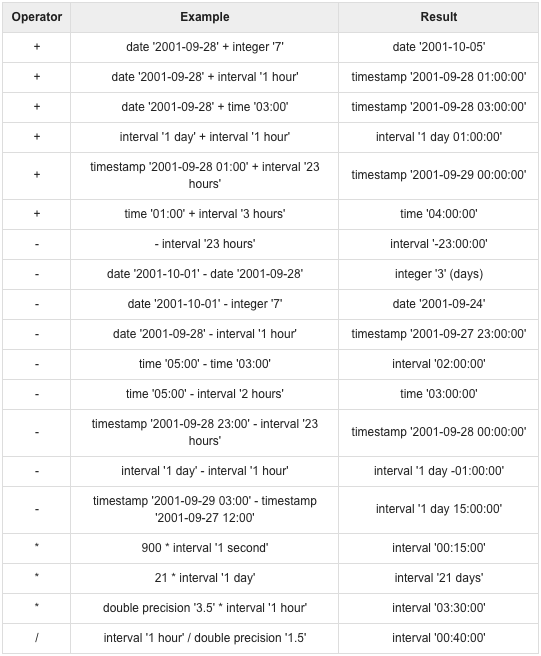PostgreSQL - DATE/TIME Functions and Operators
We had discussed about the Date/Time data types in the chapter Data Types. Now, let us see the Date/Time operators and Functions.
The following table lists the behaviors of the basic arithmetic operators −
The following is the list of all important Date and Time related functions available.
AGE(timestamp, timestamp), AGE(timestamp)
Example of the function AGE(timestamp, timestamp) is −
testdb=# SELECT AGE(timestamp '2001-04-10', timestamp '1957-06-13');
The above given PostgreSQL statement will produce the following result −
age ------------------------- 43 years 9 mons 27 days
Example of the function AGE(timestamp) is −
testdb=# select age(timestamp '1957-06-13');
The above given PostgreSQL statement will produce the following result −
age -------------------------- 55 years 10 mons 22 days
PostgreSQL provides a number of functions that return values related to the current date and time. Following are some functions −
Examples using the functions from the table above −
testdb=# SELECT CURRENT_TIME; timetz -------------------- 08:01:34.656+05:30 (1 row) testdb=# SELECT CURRENT_DATE; date ------------ 2013-05-05 (1 row) testdb=# SELECT CURRENT_TIMESTAMP; now ------------------------------- 2013-05-05 08:01:45.375+05:30 (1 row) testdb=# SELECT CURRENT_TIMESTAMP(2); timestamptz ------------------------------ 2013-05-05 08:01:50.89+05:30 (1 row) testdb=# SELECT LOCALTIMESTAMP; timestamp ------------------------ 2013-05-05 08:01:55.75 (1 row)
PostgreSQL also provides functions that return the start time of the current statement, as well as the actual current time at the instant the function is called. These functions are −
DATE_PART(text, timestamp), DATE_PART(text, interval), DATE_TRUNC(text, timestamp)
The following are examples for DATE_PART('field', source) functions −
testdb=# SELECT date_part('day', TIMESTAMP '2001-02-16 20:38:40'); date_part ----------- 16 (1 row) testdb=# SELECT date_part('hour', INTERVAL '4 hours 3 minutes'); date_part ----------- 4 (1 row)
The following are examples for DATE_TRUNC('field', source) functions −
testdb=# SELECT date_trunc('hour', TIMESTAMP '2001-02-16 20:38:40'); date_trunc --------------------- 2001-02-16 20:00:00 (1 row) testdb=# SELECT date_trunc('year', TIMESTAMP '2001-02-16 20:38:40'); date_trunc --------------------- 2001-01-01 00:00:00 (1 row)
The EXTRACT(field FROM source) function retrieves subfields such as year or hour from date/time values. The source must be a value expression of type timestamp, time, or interval. The field is an identifier or string that selects what field to extract from the source value. The EXTRACT function returns values of type double precision.
The following are valid field names (similar to DATE_PART function field names): century, day, decade, dow, doy, epoch, hour, isodow, isoyear, microseconds, millennium, milliseconds, minute, month, quarter, second, timezone, timezone_hour, timezone_minute, week, year.
The following are examples of EXTRACT('field', source) functions −
testdb=# SELECT EXTRACT(CENTURY FROM TIMESTAMP '2000-12-16 12:21:13'); date_part ----------- 20 (1 row) testdb=# SELECT EXTRACT(DAY FROM TIMESTAMP '2001-02-16 20:38:40'); date_part ----------- 16 (1 row)
The following are the examples of the ISFINITE() functions −
testdb=# SELECT isfinite(date '2001-02-16'); isfinite ---------- t (1 row) testdb=# SELECT isfinite(timestamp '2001-02-16 21:28:30'); isfinite ---------- t (1 row) testdb=# SELECT isfinite(interval '4 hours'); isfinite ---------- t (1 row)
The following are the examples for the ISFINITE() functions −
testdb=# SELECT justify_days(interval '35 days'); justify_days -------------- 1 mon 5 days (1 row) testdb=# SELECT justify_hours(interval '27 hours'); justify_hours ---------------- 1 day 03:00:00 (1 row) testdb=# SELECT justify_interval(interval '1 mon -1 hour'); justify_interval ------------------ 29 days 23:00:00 (1 row)








Comments
Post a Comment